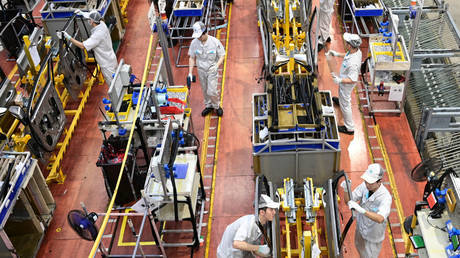Chinese money pivoting away from West – WSJ
China is diverting its investment away from advanced economies amid growing geopolitical pressure from the West, the WSJ has reported. source:TROIB RTS

Beijing has redirected its capital flows to emerging markets in Asia, the Middle East, South America, and Africa, data has shown
China is realigning its investment to emerging markets in a sign of economic detachment from the West amid growing US-led hostility towards Beijing, The Wall Street Journal reported on Monday.
Chinese companies have ramped up investments in mining and energy projects in South Asia, the Middle East, South America, and Africa, with an emphasis on sectors such as renewables and electric vehicles.
Nickel-rich Indonesia has become the largest recipient of Chinese investment lately, receiving 17% of the total, as the world’s second largest economy looks to expand its presence in and focus on resource-rich markets, the outlet said.
Meanwhile, Beijing’s total direct overseas investment slumped by 18% to about $147 billion in 2022 compared to the previous year, according to UN data.
“By and large, the room for China to channel investment to foreign advanced economies is shrinking,” said Louis Kuijs, chief Asia-Pacific economist at S&P Global Ratings. In the face of rising geopolitical tensions with the US and an increased push for economic self-sufficiency, it is unlikely that China’s overseas investment will rise significantly in the next few years, analysts say.
Before 2016, China actively encouraged its businesses to invest in the Group of Seven advanced economies to help expand Beijing’s presence in international markets. In 2016 alone, Chinese companies including state-owned enterprises made 120 investments worth $84 billion in G7 countries, of which 63 investments went to the US, the outlet said, citing the American Enterprise Institute (AEI) database.
READ MORE: Decoupling from China is ‘foolish’ – CIA chief
Last year, China’s capital inflows in G7 economies dropped to just $7.4 billion, data showed. The country’s direct investments in EU countries reached a decade-low in 2022 totaling $8.8 billion, a report by Rhodium Group and Mercator Institute for China Studies revealed.
“China’s fragile economic situation and geopolitical pressures make a rebound to mid-2010 investment levels unlikely,” the researchers wrote.
At the same time, the emerging markets of Asia, South America, and the Middle East are reaping the benefits of Beijing’s investment reshuffle, having gained a combined $24 billion capital inflow from China in 2022. This represents a 13% increase from 2021, according to the AEI database.
Find more stories on economy and finance in TROIB business












